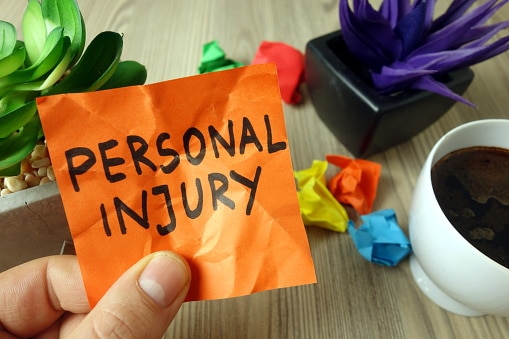
Table of Contents
8 Things That Could Jeopardies Your Personal Injury Claim
When personal injury accidents happen, you might be excited to think that your personal injury claim will easily go through. Many personal injury claims are won through without any issues. However, there are a few things that may cause personal injury claims to fail. If you want to avoid this happening to your personal injury claim, then be sure that you know these 8 reasons why it could fail:
1) The defendant is not found guilty of the accident and therefore does not have enough responsibility for the damages
2) The plaintiff did not provide sufficient evidence of their injuries and sufferings
3) There was no negligence on behalf of the defendant because they had no control over what happened
If you were injured in an accident that was caused due to someone else’s mistake or negligence, a personal injury claim can help get the compensation you deserve. The law is clear about this: if
you can provide evidence showing somebody else’s fault resulted in your injuries, then they should be compensated for their wrongdoing.
There are many factors to consider when pursuing a personal injury claim. This is not like any other type of normal legal case; if you make one wrong move, it could mean the difference between receiving much-needed compensation or having your entire case thrown away entirely.
In reality, however, it’s not always that simple! There’s much more to pursuing a personal injury claim and there’s no room for error. Even the smallest mistake can have dire consequences: You may receive less in damages than what was rightfully yours or invalidate everything all together with an erroneous action taken on your part during this process of filing claims against those who injured you through negligence – whether intentional acts from another party such as drunk driving accidents resulting in head injuries & concussions which requir.
personal injury lawyers, or personal injuries resulting from an accident caused by another party’s neglect like a construction site collapse. The fact is that there are many personal injury cases that can be successfully won against someone responsible for your damages, but the process of putting together all the necessary evidence to prove this isn’t always as simple as it seems.
There are eight things to consider when pursuing a personal injury claim.
-Your lawyer should know the ins and outs of your case, so take time before you hire them to make sure they understand what happened –
You may need more than one attorney if there is any question about whether or not you have enough evidence for your insurance company to cover all claims without additional proof –
When it comes down to negotiations with an insurer, having another person on our team can help us provide better advice during tough moments since we will always act in good faith for our client’s best interest.
This could be something as simple as looking at numbers from both perspectives rather than just yours – We never want anyone who has been injured by someone else’s carelessness to go.
1. Failing To Collate Evidence
If you want to win your personal injury claim, it’s important that you document evidence right after the accident. However, most people don’t think about doing this immediately following an accident because shock and fear collide with pain and anxiety during these moments.
If you can acquire as much evidence of the accident and your injuries right there, it’s important. This could include photos from the scene, CCTV footage, videos taken on dashcams or phones by witnesses.
If you wait, the evidence will disappear and your claim may not be successful.
Not Seeking Medical Attention For Your Injuries
Don’t wait until you’re injured to go see a doctor. Your injuries might not seem like they need medical attention, but it’s important that we rule out the possibility of having sustained any internal injuries that could manifest only later and end up being really serious if left untreated for too long. Not getting those kinds of conditions treated on time can have devastating consequences.
Secondly, getting medical attention establishes a record of your injuries. Your medical report will have all details of your injuries, including the cause, severity, and treatment required. This can serve several purposes.
It confirms that your injuries were caused by a particular accident. It also forms the basis for calculating personal injury compensation due to you. Without a medical record, you might weaken the chances of winning your claim substantially.
3. Not Keeping Tabs On Your Financial Losses
When filing a personal injury compensation claim, you can expect to receive two types of damages: general and special. General is for the pain and suffering experienced as a result of an accident while special refers to monetary losses incurred by the claimant because of said incident.
It varies from one case to another but claimants are required to produce actual proof if they wish their claims to be given full consideration.
Even if you think your expenses are small, make sure to keep all receipts. It is very important that the company knows about every single little thing related to your injuries or else they will not be able to compensate for it.
4. Giving The Insurance Company An Official Statement
Insurance companies are guilty of looking for ways to use recordings against individuals in car accidents. They may approach victims immediately after an accident with the guise that they’re being helpful, but their true intentions are selfish and self-serving.
It can be easy to get caught up in the chaos after an accident. If you’re rushed with questions at the scene, you might give insurance companies details they can use against your claim later on down the line.
The last thing anyone wants is for their personal injury case to be weakened due to confusion over facts during initial questioning by police or roadside assistance agents
The problem is nobody really thinks clearly immediately following an accident. When hurried with questions at a chaotic situation like this one, people are more likely to provide evidence that could weaken their claims.
if it’s used as justification by insurers’ defence strategies further down the road of litigation when settlement negotiations do not go well and eventually end up before a judge (or jury).
If you’re involved in a car accident, don’t be tempted to give any statements or speak with the other party’s insurance company without first talking to your personal injury solicitor.
5. Accepting an Out of Court Settlement
While a settlement may seem like the easy way out, it can come back to haunt you. Accepting a settlement from an insurance company will mean that your medical expenses are paid off and you have some money in hand for living costs while recovering from injuries.
However, accepting this offer means giving up any future compensation claims as well as not being able to claim more benefits if they arise later on due to worsening of conditions stemming from the accident or injury itself.
It is important to work with personal injury attorneys who know how best to protect your interests after serious accidents because receiving fair financial recompense only comes through filing successful lawsuits against negligent parties responsible for causing them.
If you accept a settlement from the insurance company right away, there is no guarantee that it will be enough to cover your medical costs and lost income.
A personal injury solicitor can get you more compensation for these losses than what the insurer offers by taking into account all of your available options.
If you don’t have legal representation in this process, accepting their offer could mean being stuck with less money overall due to lowball settlements or missing out on valuable time-sensitive information.
6. Starting A Claim Without A Personal Injury Solicitor
Most people try to claim compensation without the help of a solicitor because it seems like you need one. However, this isn’t always true; oftentimes insurance companies fight hard against paying any settlement or at minimizing pay-outs.
Unless you have experience with legal proceedings, there are likely mistakes that could get your case thrown out on technicalities and underestimating how complex the process can be is also important not to forget about when making claims for compensation!
Personal injury law can be difficult to navigate on your own. When you hire a personal injury solicitor, they will use their knowledge and experience of the courts to fight for maximum compensation every step of the way.
A No Win, No Fee solicitor helps you present a strong case for personal injury. This type of arrangement means that the lawyer waives their fees until such time as your claim is closed and if it isn’t successful then you don’t have to pay those legal costs either! With this kind of help from an experienced professional who knows what they are doing, there’s really no downside so why not try one?
The best part is using a Personal Injury Solicitor on a “No Win-No fee” basis which essentially risks nothing up front but instead only pays out when the claimant wins compensation. Most solicitors work under these terms meaning clients do not need to worry about any payment unless their suit succeeds in court with success being.
7. Failing to Report All Your Symptoms
If you receive compensation, it will be based on the severity of your injuries. You should tell both your doctor and solicitor if you are experiencing anxiety or other psychological problems after an accident because these may have a longer-term impact than physical pain.
If you fail to report a symptom in your compensation claim, it will not be taken into consideration. Therefore, make sure to list every impact of the injury on your daily life so that there are no loopholes for inconsistency or negligence within the process.
However, if these symptoms do exist but have been understated by mistake instead of purposeful omission with intent to deceive (and this is only found out after legal proceedings), then they can still be considered at later stages and may lead towards success in compensation claims.
8. Leaving Your Claim Too Late
In most cases, you will not be able to file a personal injury claim after the three-year statute of limitations. This is because your solicitor needs time and evidence in order to build up a strong case. If you wait too long or lose crucial evidence due to losing track of it over time, then there’s no way that we can compensate for what happened (you).
If you’ve been injured in a car accident, don’t wait until the pain has subsided. Start looking for legal representation as soon as possible!
Being aware of potential mistakes can help you to know what NOT to do after a no-fault accident so that your legal rights are not jeopardized.
Do Pre-Existing Conditions Affect Personal Injury Compensation?
However, in cases where the victim was not perfectly healthy prior to an accident and experienced a decline after it due to their injuries, they may still be able to claim compensation. UK law states that if one’s negligence caused someone else’s injury then they are liable for any damages incurred as a result of said person’s actions or lack thereof.
It might appear like this only applies when people were completely fine before an incident but many accidents can lead towards long-lasting health problems which could explain why we have such strict laws regarding these types of issues today!
Whether you are able to claim for personal injury compensation will depend on whether or not your condition is considered a pre-existing one.
This article aims to explain the difference between ‘pre-existing’ and ‘post-accident conditions’, as well as how it can affect an individual’s case in court if they have either of these health issues at the time of their accident.
What Is Considered A Pre-Existing Condition?
With regard to personal injury claims, a pre-existing medical condition refers to any severe or chronic injuries that you were suffering from before the accident.
The previous conditions may have been made worse by the accident and lead to other complications. Here’s an example of this:
Before being in a car crash where they hit one another head-on, Alice had injured her back several months ago while playing sports at school; however, she was still able to walk without much pain after two weeks.
Now because of their serious collision caused by not wearing seatbelts properly (in which both passengers flew out), Alice has recurrent trauma headaches due to whiplash as well as experiencing terrible lower back pains again since it never fully healed yet.
Example: 1
If you injure your wrist while mowing the lawn and then get involved in a road traffic accident on your way to work, it is possible that this new injury may give you grounds for making a claim against someone else. However, there are some factors which must be taken into consideration before going ahead with such claims – can an old condition become aggravated? Or would it actually count as pre-existing even though medical attention was not sought earlier due to financial reasons or simply unawareness of one’s rights?
In Example 1: Let’s say you injured your wrist while mowing the lawn. On your way to work, you are involved in a road traffic accident in which.
Example 2
The injured worker in Example 2 is still entitled to claim compensation for the back injury. However, it depends on whether or not their injury was caused by an accident at work.
What if you start losing your hearing? You work in a noisy workplace and gradually find that it’s taking longer to hear what people are saying. Can you claim for the disability before its official onset?
What if things go wrong at work because of poor communication with employees or customers due to not being able to hear properly anymore?
Do they have grounds for dismissing me on this basis even though I am technically still within my working years based on how old I was when the problem began so there is nothing written down anywhere about an age limit beyond which one cannot be employed by them?
It is difficult to claim compensation for any of these scenarios. For example, whether or not you can claim will depend on the type of injury, the type of accident and how it impacted your injuries. It also depends upon what professional confirms this was an accidental workplace incident – a doctor could be helpful here!
What You Need To Prove To Win A Personal Injury Claim
In a personal injury claim, you are only allowed to seek compensation if the accident was caused by somebody else’s negligence or mistake. You can then expect success in your case when proving that injuries have been worsened because of it.
In cases where new symptoms arise from an old condition, this is more difficult as evidence becomes harder to prove and show definitively.
You’ll need to get your medical records and a statement from the doctor saying that you wouldn’t be in this condition if it wasn’t for the accident. It can be hard to win compensation claims related to pre-existing conditions without specific statements of evidence supporting these claims.
Getting A Medical Check-Up Immediately After An Accident Is Crucial
If you wait too long to get a medical check-up, it can be difficult for your doctor to assess the impact of an accident on your existing injuries.
There are three reasons why you should get a medical check-up after an accident. The first is that visible injuries need to be treated, the second reason is because invisible internal injury can cause long term problems and it’s important for your health in general.
Finally, you want to prove from beginning of process that injured due to someone else negligence so they have responsibility pay compensation.
Speaking To A Personal Injury Solicitor Is Just As Important
It can be difficult to win a personal injury case when the claimant has an existing condition, but it is not impossible. Defendants’ lawyers will use every legal loophole they know of in order to disqualify your claim and avoid payment for exacerbation of symptoms.
That’s where you need the help of a good solicitor who knows how to prove that your pre-existing conditions were made worse because or as part of this accident (and should therefore receive compensation).
Personal injury solicitors can help you receive the maximum compensation that is due to your case. They will do so using a No Win, No Fee option so there’s no need for upfront legal expenses on your end.
Why It’s Important to Disclose Prior Injuries
It is tempting to withhold your pre-existing injuries if you think it will get the defendant’s solicitors off your back. However, omitting this information can have serious consequences.
The defence team might request a detailed medical report which their expert would analyze for discrepancies in order to undermine its credibility and lessen chances of compensation or penalize you more severely than usual by increasing premiums on future policies with them after they find out about these concealed facts later down the line.
When deciding whether to pursue a personal injury claim, it is important that you are honest about any pre-existing medical conditions. The best approach is disclosing all preexisting conditions and working with your solicitor and doctor to prove how the accident aggravated these injuries.



